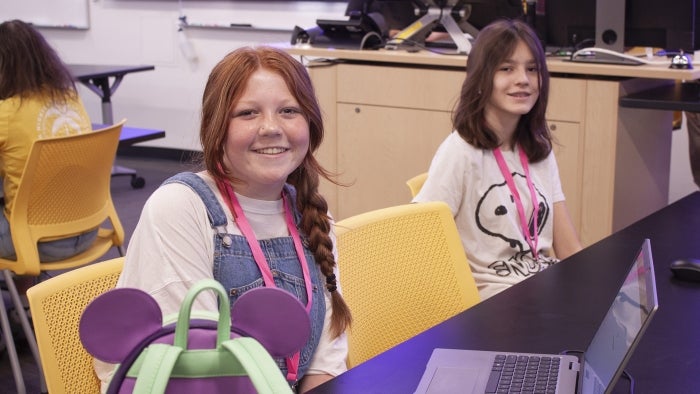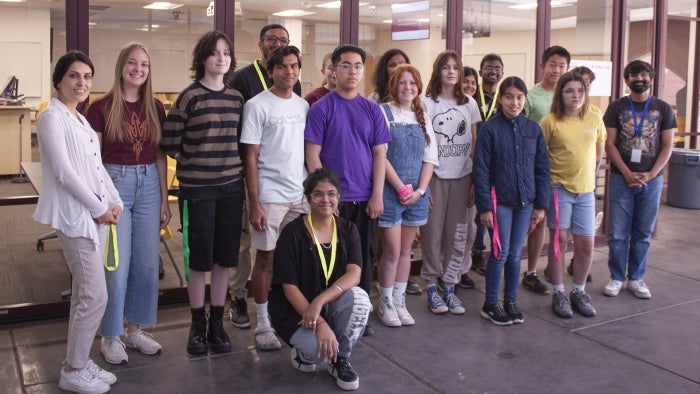Google grant creates AI research paths for underserved students

From left: Pooyan Fazli, Adil Ahmad and Hasti Seifi discuss plans for an upcoming workshop for middle school students. Fazli is an assistant professor in the School of Arts, Media and Engineering at Arizona State University, while Ahmad and Seifi are assistant professors in the School of Computing and Augmented Intelligence. The trio has received a grant from Google to develop programs that encourage underserved students to consider careers in the artificial intelligence field. Photo by Kelly deVos/ASU
Top tech companies like Google say they are eager to encourage women and members of historically underrepresented groups to consider careers in computer science research.
The dawn of the era of artificial intelligence, or AI, has made teaching a wide variety of students to create new technology even more urgent. To work properly, AI models must be trained with broad sets of data with many different kinds of users in mind.
In 2018, global giant Google created exploreCSR. The program funds efforts to create opportunities in the technology sector, especially in research, for historically underserved and underrepresented groups.
A team of interdisciplinary researchers at Arizona State University has received a three-year exploreCSR grant to develop an inclusive AI research community.
Their initiative will introduce middle schoolers to AI and its applications in diverse fields, such as cybersecurity, human-computer interaction, robotics and the arts. The ASU team will keep those students involved throughout their high school years and beyond, giving them research opportunities and experience mentoring younger students.
The work builds on a prior successful camp program held in the summer of 2024.
Middle schoolers sprout wings
“In STEM fields, mentoring is very important in supporting historically marginalized students,” Hasti Seifi says. “It helps them to have a sense of support.”
Seifi is an assistant professor of computer science and engineering in the School of Computing and Augmented Intelligence, part of the Ira A. Fulton Schools of Engineering at ASU. Over the summer, she cohosted Desert CodeSprouts, a computer science outreach workshop for middle school students.
She notes that women and other groups who have been historically underrepresented in computer science fields sometimes lack exposure to technical careers. And when existing classrooms and workplaces aren’t inclusive, young students can feel unwelcome.
Seifi is an expert in haptics who received a 2024 Faculty Early Career Development (CAREER) Award from the National Science Foundation, or NSF, for her work in programmable touch technologies.
At the Desert CodeSprouts workshop, she led a group of 11- to 13-year-old students, helping them develop their own iOS applications for a fictional pet shelter using the tool Figma. They made wireframe diagrams of their projects, discussing how to best help users connect with pets, and then chose the color schemes and photos they felt would best communicate their design ideas. The activity connected the group with tech tools and let them use their creativity to solve challenges and make new friends.
The event is serving as a template for the program’s future work. Seifi and the team will expand Desert CodeSprouts in 2025, adding increased exposure to AI to their offerings.
Know a middle schooler interested in AI?
Registration for next summer’s Desert CodeSprouts workshop for middle school students will begin soon. Sign up to receive registration updates.
X marks the spot
“The goal is basically to build a mentorship pipeline from middle school all the way to graduate school,” says Pooyan Fazli.
Fazli is an assistant professor in ASU's School of Arts, Media and Engineering — a collaborative school of the Herberger Institute for Design and the Arts and the Fulton Schools of Engineering — and a graduate faculty member in the School of Computing and Augmented Intelligence. He is an expert on the intersection of AI and robotics, studying improvements in human-robot teaming, or how to make the machines more helpful partners for people.
He brings a track record of success to the new team. Fazli has received significant funding from the NSF and Google for earlier projects that promote more inclusive AI workspaces.
The exploreCSR team will work to both mentor students and give those students experience in mentoring others. At the Desert CodeSprouts workshop, for example, Fulton Schools computer science graduate students played a key role, leading some of the activities and assisting with the development of teaching materials.
Fazli says that one especially important new aspect of the exploreCSR grant is the focus on “AI+X” where “X” represents another area of interest to the student.
“Although the focus of our project is on AI, we want to encourage students to do more research on how artificial intelligence can be applied in different ways,” he says. “The +X could be art or robotics or cybersecurity.”
The team hopes that demonstrating the broad applications of AI and other technologies will encourage students from varied backgrounds to consider STEM careers.
The X factor
“We’re trying to create a centralized hub for STEM outreach and mentorship efforts for underserved students here at ASU,” Adil Ahmad says.
Ahmad is a Fulton Schools assistant professor of computer science and engineering who specializes in cybersecurity education and research. In 2024, he received a multiyear Defense Established Program to Stimulate Competitive Research grant from the U.S. Department of Defense for his work developing logging systems to protect computer systems from cyberattacks. He also cohosted the Desert CodeSprouts workshop, guiding the students through cybersecurity learning exercises.
Ahmad says the team plans to work with faculty members across ASU to create modules for the Google-funded mentorship programs. Plans for summer camps, high school internships and research experiences are in the works.
Ahmad hopes that programs such as exploreCSR will create lasting change in the tech sector. He says the team’s main objective is to create more welcoming, inclusive spaces in technology.
“As historically underserved students participate in our workshops or camps or mentoring opportunities, we’re hoping to show them they belong,” he says.
More Science and technology

Applied Materials invests in ASU to advance technology for a brighter future
For nearly 60 years, global giant Applied Materials has been hard at work engineering technology that continues to change how microchips are made.Their products power everything from flat-panel…

Meet ASU engineering students who are improving health care, computing and more
Furthering knowledge of water resource management, increasing the efficiency of manufacturing point-of-care health diagnostic tools and exploring new uses for emerging computer memory are just some…

Turning up the light: Plants, semiconductors and fuel production
What can plants and semiconductors teach us about fuel production?ASU's Gary Moore hopes to find out.With the aim of learning how to create viable alternatives to fossil-based fuels, Moore — an…



